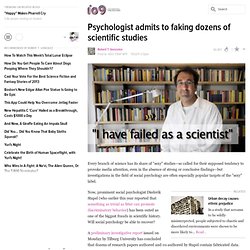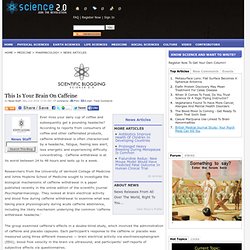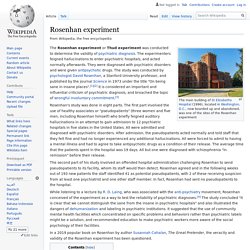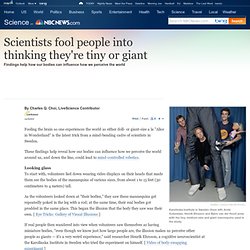

The Top 10 Psychology Studies of 2010. The end of 2010 fast approaches, and I'm thrilled to have been asked by the editors of Psychology Today to write about the Top 10 psychology studies of the year. I've focused on studies that I personally feel stand out, not only as examples of great science, but even more importantly, as examples of how the science of psychology can improve our lives.
Each study has a clear "take home" message, offering the reader an insight or a simple strategy they can use to reach their goals , strengthen their relationships, make better decisions, or become happier. If you extract the wisdom from these ten studies and apply them in your own life, 2011 just might be a very good year. 1) How to Break Bad Habits If you are trying to stop smoking , swearing, or chewing your nails, you have probably tried the strategy of distracting yourself - taking your mind off whatever it is you are trying not to do - to break the habit. J. 2) How to Make Everything Seem Easier J. Psychologist admits to faking dozens of scientific studies. They don't become celebrities in the common sense, but they can become celebrities within the scientific community, which is just as big (or perhaps bigger) a deal to them than getting on Jay Leno for an interview.

They also do stand to make a lot of money because they will be asked to give lectures all over the place, which pulls a mighty good dollar if people like what they have to say. There's two kinds of money in academia. "Hard Money" and "Soft Money". Hard money comes from a regular, budgeted source (such as state allocation to the university) that can be counted on year after year. If you spend most of your time teaching, you're more likely to be on hard money. This Is Your Brain On Caffeine. Ever miss your daily cup of coffee and subsequently get a pounding headache?

According to reports from consumers of coffee and other caffeinated products, caffeine withdrawal is often characterized by a headache, fatigue, feeling less alert, less energetic and experiencing difficulty concentrating. Caffeine withdrawal is at its worst between 24 to 48 hours and lasts up to a week. Researchers from the University of Vermont College of Medicine and Johns Hopkins School of Medicine sought to investigate the biological mechanisms of caffeine withdrawal in a paper published recently in the online edition of the scientific journal Psychopharmacology. They looked at brain electrical activity and blood flow during caffeine withdrawal to examine what was taking place physiologically during acute caffeine abstinence, including the likely mechanism underlying the common 'caffeine withdrawal headache.'
Museumgoing in the Brain. The question is, What is going on in your brain when you look at a painting "aesthetically"? Or why don't we touch things in museums? For a long time, people thinking about the arts have said that we go into some special state of mind when we look at paintings or other works of visual art. The idea has been floating around since the Greeks, but some English aestheticians, Lord Shaftesbury and Frances Hutcheson, spelled it out in the early eighteenth century.
Then Kant, at the end of the century, put it most exactly, and Kant is who most aestheticians follow. Now, we're beginning to get evidence as to how brains embody Kant's idea. In 2009, Gerald Cupchick , Oshin Vartanian , Adrian Crawley , and David Mikulis conducted an experiment on aesthetics that differed from most others. Psychology studies relevant to everyday life from PsyBlog.
The Ten Most Revealing Psych Experiments. Psychology is the study of the human mind and mental processes in relation to human behaviors - human nature.

Due to its subject matter, psychology is not considered a 'hard' science, even though psychologists do experiment and publish their findings in respected journals. Some of the experiments psychologists have conducted over the years reveal things about the way we humans think and behave that we might not want to embrace, but which can at least help keep us humble. That's something. 1. 'Lord of the Flies': Social Identity Theory The Robbers Cave Experiment is a classic social psychology experiment conducted with two groups of 11-year old boys at a state park in Oklahoma, and demonstrates just how easily an exclusive group identity is adopted and how quickly the group can degenerate into prejudice and antagonism toward outsiders.
Researcher Muzafer Sherif actually conducted a series of 3 experiments. Rosenhan experiment. Experiment to determine the validity of psychiatric diagnosis Rosenhan's study was done in eight parts.

The first part involved the use of healthy associates or "pseudopatients" (three women and five men, including Rosenhan himself) who briefly feigned auditory hallucinations in an attempt to gain admission to 12 psychiatric hospitals in five states in the United States. All were admitted and diagnosed with psychiatric disorders. After admission, the pseudopatients acted normally and told staff that they felt fine and had no longer experienced any additional hallucinations. All were forced to admit to having a mental illness and had to agree to take antipsychotic drugs as a condition of their release.
The second part of his study involved an offended hospital administration challenging Rosenhan to send pseudopatients to its facility, whom its staff would then detect. While listening to a lecture by R. Pseudopatient experiment[edit] Non-existent impostor experiment[edit] The Ten Most Revealing Psych Experiments. Scientists fool people into thinking they're tiny or giant - Technology & science - Science - LiveScience. Fooling the brain so one experiences the world as either doll- or giant-size a la "Alice in Wonderland" is the latest trick from a mind-bending cadre of scientists in Sweden.

These findings help reveal how our bodies can influence how we perceive the world around us, and down the line, could lead to mind-controlled robotics. The Top 10 Psychology Studies of 2010.